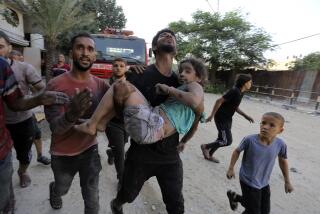What War Coverage Omits
- Share via
I bet the folks at the Pentagon are sorry they ever dreamed up the idea of embedding journalists. It is from these brave souls, however restricted, that we hear the truth about this conflict. Meanwhile, the Pentagon briefings are a joke. Army Maj. Gen. Stanley McChrystal either won’t tell, doesn’t know or will get back to us later, while the distaff half of the “Stan and Tori” show, Pentagon spokeswoman Victoria Clarke, wastes reporters’ time by mindlessly mouthing her meaningless mantra in almost verbatim repetition day after day.
These are no briefings! They are an insult to our intelligence.
Fred Bauman
Riverside
*
I am disturbed by the U.S. media’s coverage of the war against Iraq. We see nightly images of bombs bursting in the air, but we rarely see any images of their consequences. The U.S. media are sanitizing this war, especially when it comes to American casualties and prisoners of war. The Times has repeatedly published photographs on the front page of Iraqi prisoners of war, and now dead Iraqi soldiers sprawled face down in the dirt (March 28).
There are images of American soldiers who are prisoners of war or who have been killed. The Times has not published any of these images, however. War is hell, and it is important for the American public, which is being asked to unleash its incredible military machine with all its destructive force, to truly understand and see all the images of war. Start publishing pictures of the aftermath on the ground.
Kate Nahapetian
San Diego
*
Re “For This Arab Family, State-Run TV Shaping Views,” March 30: There are many similarities between Arab television and television in the U.S. Although we do not technically have a state-run TV, we might as well. Television news in the U.S. has come to have two functions.
The first is to slavishly repeat whatever the government reports without questioning the accuracy. And the second is to entertain the masses with flashy pictures, half-truths and one-sided, incomplete information. The few voices of rational and honest debate about the relevant issues take place on the editorial pages of newspapers, public radio and public television.
Unfortunately, public radio and public television do not have the mass appeal of major TV outlets, and most Americans skip over the editorial pages (not enough pictures). Thus, corporate-run/state-run TV shapes and misinforms the American view of the Arab world and the war. Let us hope no one comes to liberate us from our distorted democracy with bombs and occupying troops.
Will Breitbach
Burbank
*
We hear it often said that the real battle and challenge in Iraq is to win the minds and hearts of the Iraqi and Arab peoples. The precise way not to do that is to keep showing images of America’s power, as demonstrated by exploding buildings, hooded and handcuffed captives, lines of people waiting to be interrogated, etc. This may cause others to respect and fear our power, but it further alienates us from those with whom we desperately need to connect.
My suggestion is to refocus virtually all reporting. Instead of interviewing military commanders regarding the conduct of the war, show reporters interviewing the Iraqi people who are fleeing the reign of terror. Let men, women and children keep speaking of how they and their families have been threatened, tortured or killed and not allowed to leave. Let them describe how Iraqi troops are using civilian areas to operate out of. Let them speak of their life under the current regime. Keep showing the photos of soldiers leading people out of harm’s way.
Forget the images of American power and focus on American compassion. Stop giving people more and more cause to hate. We must make certain that the world keeps hearing from the Iraqi people and sees a steady barrage of the gentle side of the Americans. If they see the ugly side of the Iraqi regime firsthand, we give ourselves a chance to win the more important war.
Sid Pelston
Marina del Rey
*
The most significant aspect of the firing of award-winning journalist Peter Arnett for stating the obvious is the chilling message it sends to American journalists, who hardly need one. They are already happily behaving as cheerleaders for the Pentagon. For those who claim that Arnett’s crime was stating the obvious on Iraqi -- as opposed to American -- television, I thought we were fighting this war to bring democracy to Iraq. We have set a fine example of our commitment to a free press.
Samirah Laban
Garden Grove
More to Read
Sign up for Essential California
The most important California stories and recommendations in your inbox every morning.
You may occasionally receive promotional content from the Los Angeles Times.













